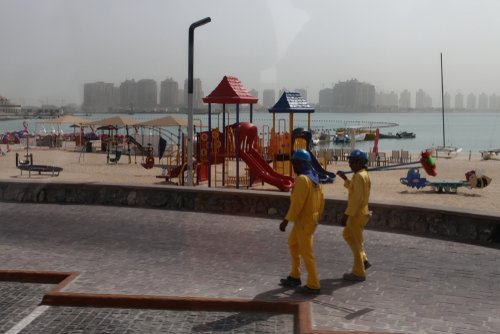Belgium, (Brussels Morning Newspaper) A top minister from Qatar will face a grilling by MEPs over his country’s rights record next week. Ali Bin Samikh Al Marri, Minister of Labour of the State of Qatar, is among those speaking at a event in parliament on Monday.
Others include Max Tunon, Head of the International Labour Organization Office in Doha and Minky Worden, Director of Global Initiatives at Human Rights Watch.
All will be questioned by the Subcommittee on Human Rights. The event is timely with the World Cup about to kick off in Qatar next week.
Over 90 pc of Qatar’s workforce are migrants, of which one million work in construction.
Although the country has introduced several labour reform measures in the last few years, for instance introducing a minimum wage and allowing workers to change jobs without needing permission from employers, migrant workers in Qatar still face harsh, and sometimes fatal, conditions.
Enormous natural gas resources have turned Qatar into one of the world’s richest countries.
The 11 610 km2 nation currently has the fourth highest GDP per capita in the world.
The absolute monarchy’s estimated 340 000-350 000 citizens benefit from free education, free healthcare, virtually guaranteed – and well paid – employment, and pay almost no taxes.
However, the great majority of the emirate’s nearly 3 million inhabitants live in very different conditions. Qatar has the highest ratio of migrants in the world: 85 % of its population are migrants and 94 % of its workforce comes from abroad, mostly from south Asia and Africa. In contrast to the small percentage of expatriates from the West and other Gulf States, Asian and African migrants live and work in harsh conditions.
Around 1 million are employed in construction, and 100 000 are domestic workers. In December 2010, FIFA, world football’s governing body, granted Qatar the right to host the 2022 World Cup, which is scheduled to take place from 21 November to 18 December.
Expanding on an existing development programme enshrined in the Qatar National Vision 2030, the country embarked on an extensive building programme to prepare for the World Cup, involving an estimated 1 million migrant workers. However, these preparations placed the spotlight on Qatar’s poor treatment of migrant workers. In response to international pressure, Qatar has introduced important legal changes to improve the situation of these workers, which the EU has welcomed.
However, according to human rights organisations, the country needs to take further steps to stop abuses. Of particular concern is the kafala sponsorship system, which is widely used throughout the six Gulf Cooperation Council States and gives disproportionate power to employers, leading to widespread abuse of migrant workers’ rights.
Even though Qatar has started to dismantle the kafala system, important elements remain in place. Moreover, ensuring compliance with more favourable labour laws remains a challenge.
Since 2008, the European Parliament has adopted four resolutions addressing the situation of migrant workers in Qatar; it has called on Qatar to end the ‘deplorable situation’ of migrant workers and prevent preparations for the 2022 World Cup from being ‘overshadowed by allegations of forced labour’.
An EPP spokesman told BM: “The preparations for the World Cup came under fire over working conditions and the dire treatment of migrant workers in Qatar, especially after a number of them died on World Cup-related construction sites. While FIFA urges World Cup countries to ‘focus on football’, not Qatar human rights issues, the EPP group insists that football cannot be at the expense of human rights.”




